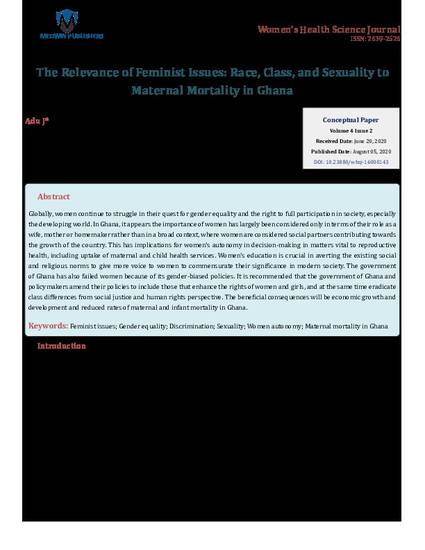
Article
the-relevance-of-feminist-issues-race-class-and-sexuality-to-maternal-mortality-in-ghana.pdf
Women's Health Science Journal
(2020)
Abstract
Globally, women continue to struggle in their quest for gender equality and the right to full participation in society, especially the developing world. In Ghana, it appears the importance of women has largely been considered only in terms of their role as a wife, mother or homemaker rather than in a broad context, where women are considered social partners contributing towards the growth of the country. This has implications for women’s autonomy in decision-making in matters vital to reproductive health, including uptake of maternal and child health services. Women’s education is crucial in averting the existing social and religious norms to give more voice to women to commensurate their significance in modern society. The government of Ghana has also failed women because of its gender-biased policies. It is recommended that the government of Ghana and policymakers amend their policies to include those that enhance the rights of women and girls, and at the same time eradicate class differences from social justice and human rights perspective. The beneficial consequences will be economic growth and development and reduced rates of maternal and infant mortality in Ghana.
Keywords
- Feminist issues; Gender equality; Discrimination; Sexuality; Women autonomy; Maternal mortality in Ghana
Disciplines
Publication Date
Summer August 5, 2020
Citation Information
Joseph Adu. "the-relevance-of-feminist-issues-race-class-and-sexuality-to-maternal-mortality-in-ghana.pdf" Women's Health Science Journal (2020) Available at: http://works.bepress.com/joseph-adu/5/
